Note: The following article contains major spoilers for VA-11 HALL-A: Cyberpunk Bartender Action.
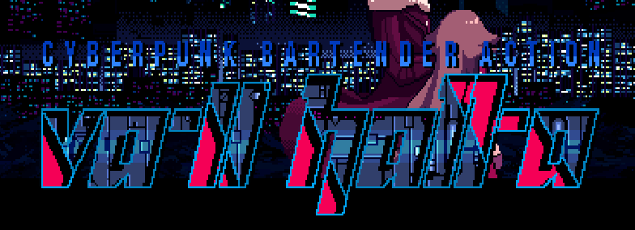
As VA-11 HALL-A had me mixing ingredients for discerning customers at the counter of a bar, there was one and only one other game I found myself comparing it to: Cook, Serve, Delicious. There are a smattering of games set in drinking and dining establishments, but unlike so many others, both VA-11 HALL-A and Cook, Serve, Delicious have you working on your own without aid from other players or characters, put the camera at eye level, and don't ever have you move an avatar about the screen. In Cook, Serve, Delicious, the placement of the camera in close proximity to the food makes you feel like you could reach out and grab it, and you being fixed in one spot in the restaurant means that the play becomes more about the preparation of the orders than it does rushing about the place as you are in Diner Dash or Tapper. VA-11 HALL-A inherits these characteristics; it wants you to get an eyeful of the drinks and not worry about taking orders to tables or spending too much energy on cleaning up the place. In fact, it makes a point of having another bartender be the workhorse who gets stuck with the chores so you can focus on mixing drinks and saving lives. But we can learn even more about VA-11 HALL-A from looking at where it parts company with Cook, Serve, Delicious.
While CSD strives for culinary accuracy in the ingredients you put into each meal, the temptations served up at VA-11 HALL-A's eponymous bar are all made of the same five fictional mixers, as the play is more concerned with different measures of a few ingredients than with applications of many different ingredients, and save from the big hitters like absinthe and tea, all its drinks are made up. There are a few disadvantages to this: First off, beer is now a cocktail which was something I could never adjust to; secondly, you don't get the authentic experience of mixing these beverages; and thirdly, there's little indication what the concoctions you're sliding across the counter taste like. Audiovisual mediums like video games can perfectly replicate what an object, person, or event looks or sounds like, but directly conveying flavour is outside their wheelhouse.
However, what VA-11 HALL-A sacrifices in realism, it makes back in theming and streamlining. Most of the drinks are alien to us because they're meant to be from the future and boiling down their components to five ingredients means that whipping up cocktails never becomes too complex in a game that wants to demote the drinks preparation to a secondary task. While Cook, Serve, Delicious was unrelenting prep, plating, and cleaning, VA-11 HALL-A is mixing a drink maybe once every five minutes and spending the rest of the time chatting with the colourful clientele. To a game like CSD, the food/drink is the point, the game's shell has calcified around it, but to VA-11 HALL-A, the drinks are just a way to get everyone around the table and talking, and that dialogue is the real point.
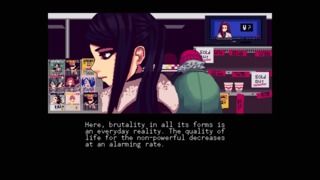
The priorities in these restaurants are different because the speeds they move at are different. In Cook, Serve, Delicious, the restaurant is bustling because the game is about creating a successful business and the designers are giving you the customers to do that. In a cyberpunk universe, however, the little guy never hits it big. In VA-11 HALL-A, every night is the slow night, and the vultures are circling: the bar is due to be shut down at the end of the year. The stakes are not whether you can make the business a success; that ship has sailed, but in lieu of keeping the shutters open, you can still make rent and make friends as long as you've got that shaker in your hand.
The dingy, backwater bar is, of course, not a setting that VA-11 HALL-A introduces to cyberpunk; it pops up in countless works across the genre, and cyberpunk ended up holding onto the trope because its precursor, film noir, was so attached to it. In both these genres, writers break out the drinking house when it's time for exposition and for characters to exchange words because bars have a rich history as working class meeting places and because characters tend to have looser lips when relaxing and plied with alcohol. So as a game about character drama and comedy, VA-11 HALL-A couldn't have picked a better setting than the bar. The designers even let you add more Irish to your customers' drinks if you want to lubricate the conversation a little. In noir and cyberpunk, the bartender is always the one that the investigator asks for leads because they have an ear to so many peoples' discussions. This means that being the bartender in VA-11 HALL-A is to witness a cross-section of its world. But the story as we experience it often has trouble hitting the same notes that its themes suggest it should.
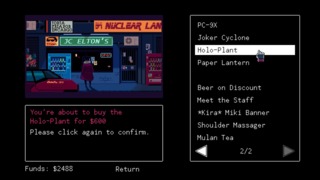
This is cyberpunk fiction: It's an amalgam of poverty, urban warfare, power abuse, and peoples' own electronics turning against them. Those phenomena would naturally give rise to an environment of fear and despair, and sometimes that comes through in this game, particularly in the demanding bills that keep sliding through the protagonist, Jill's, letterbox. At first, it's only her magazine subscription in jeopardy, but then she's told if she can't pony up that her power will get shut off, and eventually, that she'll lose her home. As the player, it's up to us to secure a salary that will stop that happening. It's roughly the same device you've seen in Cart Life and Papers, Please but with a couple of edits:
1. Our protagonist needs to pay rent and utilities but also benefits from little indulgences like figurines and posters. If you buy them, then every time you mix a drink, the game displays a reminder of what the customer just ordered. I rarely found myself forgetful enough to be leaning on this feature, but it's at least an effort to express that the items we often think of as luxuries are still necessary to a person's well-being. It's trying to poke at this concept that job performance impacts how many luxury goods we can buy but how many luxury goods we can buy impacts job performance which both impact how well we can pay for the essentials.
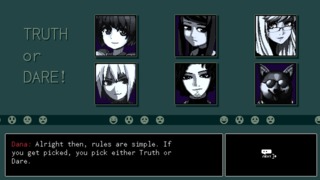
2. It's likely that on your first playthrough of the story, you won't make rent, but that doesn't necessarily lead to a "bad ending" because if you can form a committed bond with a bar patron, or at least not completely repel all of them, one of these newfound friends will take Jill into their home. Another game wouldn't provide this safety net because having the player's fate be solely down to how the player performed provides the maximum player agency, but as many games are discovering, it's giving characters beyond the player agency which often makes them full people. VA-11 HALL-A's decision to let other characters save the protagonist cements the friendship between you and them.
This is a genre of high tech low life; it's a future where marvels like augmented reality and hover cars are a transaction away but where freedom and safety are rarified commodities. Most video games, as player empowerment media, approach cyberpunk in a way that gives you all the cool gadgets without feeling too threatened by any of society's dysfunctionality. Becoming homeless is something that happens to an NPC; not something the protagonist needs to stress about, but VA-11 HALL-A doesn't wrap the player character in cotton wool like that, and I'm so thankful for it. Yet we can't totally explore the dynamics between the protagonist, her customers, and her finances until we've explored how you fill up your pay packet and form allyships with the barflies.
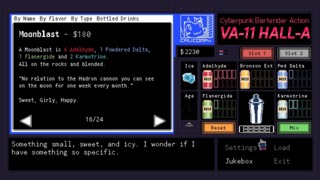
Most drinks orders are straightforward, e.g. A character asks for a "Blue Fairy", and you need to get them a Blue Fairy. Some require a little more memorisation or research, such as serving characters "their regular" or "something bitter". Others are right off the map like a character asking for something to wash a spicy taste out of their mouth and the solution being to give them a sweet drink or a mysterious visitor ordering a drink with just the number "seventeen" and expecting a cocktail with seventeen ingredients in it. Whether or not you keep your home boils down to whether you can solve these sometimes oblique alcoholic riddles and that doesn't feel true-to-life. Worse, in a game that is first and foremost about character, it declares that whether a character trusts another enough to help them in a time of crisis is not a matter of their altruism, how well they know each other, or the sense of duty between the two. It's instead down to whether one friend is good enough at solving the other's cryptic booze puzzles. While VA-11 HALL-A is, in the longview, more about the way that people can come together around drinks than the drinks themselves, here it confuses its priorities. While the game otherwise empathises when the world values people for their capacity to produce a good or service rather than for their humanity, in this mechanic, the game falls afoul of the same mindset, declaring that what people care about in a relationship is whether the other party assembled products for them correctly.
And while there is that big, wide world of financial insecurity and rogue hackers out there, its cries are muffled by the walls of the bar and are not present in the demeanour of the customers. For a game set in a city where the boot of the rich is coming down on the face of the poor, VA-11 HALL-A sure has a lot of carefree cheer. Soldiers for hire greet you with a grin, and assassinations and riots are spoken about with a casual, almost nonchalant drawl. I think I understand what developer Sukeban Games were chasing. The studio is based in Venezuela, making this title a fascinating cultural team-up: It's a Venezuelan studio working in a literary genre cultivated in America, inspired by Japanese art and life. While the technological excess of Japan and the U.S. is present in VA-11 HALL-A, it's also worth noting that, unlike most cyberpunk, it was created by people who were experiencing economic collapse and government corruption at the time they were writing their story. The designer Christopher Ortiz had this to say about how those current events inspired the game:
"[VA-11 HALL-A] is based in our experience of living in a third world country, where it's natural to look for a place where you can be happy without the constant bad news. [...] we came up with a set of characters who, in the middle of this disaster, try to go on with their lives and be as happy as they can with what they have".
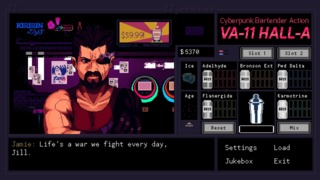
You feel that optimism from the game's personalities but it is intended to be positivity in the face of grim turmoil, and you don't see much of the suffering because almost the entire game takes place in the bar, not where the action is happening. This means the optimism doesn't come off as courageous as it otherwise might. I'm not saying that any fiction is mandated to adopt the tone that its genre has historically adopted, but the dour mood of cyberpunk literature and film is not a mistake, it's the natural result of its characters living in cities caught in economic disarray. Now, you might not expect the single room format to interrupt this vision that much considering that there are works from other media that take place overwhelmingly or entirely in a single room and pull it off. There's the Breaking Bad episode Fly, there's the 2016 film 10 Cloverfield Lane, and there's the Jean-Paul Sartre play No Exit, to name just a few examples. Media is often confined to one room because of the high practicality and low budget it provides, so it's not surprising that indie games would also have single room fictions or that they might come from somewhere like Venezuela where enormous funds for your media product aren't just kicking around. But those successful one room media properties I mentioned are supported in ways VA-11 HALL-A is not.
In the case of television programmes that do this, characters and worlds are established and developed outside of that single room in other episodes, and almost every single piece of media using the aforementioned format is not as ambitious in its scope as VA-11 HALL-A. Almost never do these works tie themselves to elaborate worlds outside the room because they know the audience is never going to see that universe. Those that are character dramas also typically try to whittle their cast down to as few members as possible (note that Breaking Bad episode uses only two characters) and most cut off before the concept becomes tired. The longest single location work of art or entertainment I know of is the 2009 film Exam which clocks in at a relatively lean one hundred and one minutes. But VA-11 HALL-A? One playthrough of VA-11 HALL-A is a good ten hours, it's trying to follow plotlines for eighteen different customers and Jill herself, and it's trying to invent a whole set of technologies and history for its universe. It's an elephant in a bathroom; it's a city in a thimble.
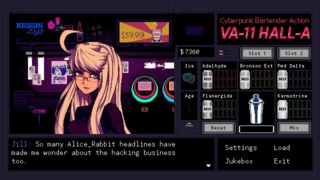
In trying to tell a huge story in a tiny setting, it not only prevents you from getting a look at how the broader world operates and how debilitating it is to exist in it, but it additionally means that you never get to see any of these characters live their lives and that makes them feel thinner. It also relegates the game to always telling rather than showing. The game's script clots with exposition dumps and primers on the concepts and events that fill out Glitch City because it can never let you discover them first-hand. It's also frustrating that the game stifles its voice in this way because it's so reliant on you making a connection with its cast and this issue interferes with that. Sukeban is right that having a wide array of personalities in your script is one way to include all walks of life, but it also means almost your entire cast feels like background characters and that the writers can't take the time to flesh out any one of them fully. It's a shame, particularly because the game goes hard on representing characters across the spectrum of sexualities and so you want to see them in all their potential glory.
What I appreciate most about VA-11 HALL-A's gay and bi characters is that I can talk about them in the plural, that there's more than one of them. Including one LGB character in your piece of entertainment is better than none, but also usually carries its own damning implication. "Queer person" is often framed as a singular archetype to be checked off the same way "The group clown" or "The leader" might be. Heterosexual characters are allowed a range of traits and personalities, while gay and bi characters have traditionally not been granted the same, with their sexuality being seen as a partial replacement for a personality or necessarily packaged with inherent personality traits. It's also often assumed through this style of character writing that gay or queer is some singular preloaded sexual experience when people can have any number of different journies with sex and romance outside of the cisgender/heterosexual norm.
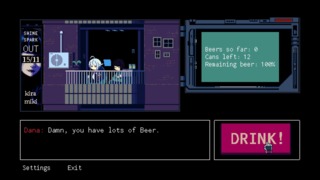
VA-11 HALL-A is an example of how to do better. The protagonist Jill is a bi woman who had a long-term relationship with a lady that she didn't receive closure on, Mario is a gay man who is insecure about his attraction to men, Betty is a lesbian who has a string of relationships she ended for petty reasons, and so on. The game feels like its rationing its character depth, but even with its relatively simplified cast, it's able to show that romance and sexuality are facets of identity that each person relates to differently and that lead to disparate social encounters, not a predetermined bundle of experiences given to any non-straight person.
But despite its LGB inclusion, VA-11 HALL-A isn't always on its A game when it approaches sexuality. Please skip the remainder of this paragraph if you don't want to read about issues of sexual assault and paedophilia. The protagonist thinks it's hilarious that one of the cocktails in her book is called a "Bad Touch" (Get it? Like molestation) and Mario is often reduced to a gay character defined only by his masculine crisis which is inherently related to his sexual insecurity. Too frequently he is treated as nothing more than a walking, talking sexuality. Then there's the character of Dorothy, and I probably wouldn't have spent time dwelling on where the game fails to do sexual topics justice if it weren't for the shockingly damaging decision they make with this one NPC. Dorothy is a robot prostitute with the body of a ten to thirteen-year-old. All the characters remain comfortable with this, and the game keeps the tone surrounding discussions of her work jovial and non-critical. Now, Dorothy isn't equivalent to a child prostitute because, as a robot, she can appear as a pre-adolescent while having the psychological wiring of an adult. Mentally, she is twenty-four, but what's categorically disturbing is that the game talks about characters indulging their desire to have sex with a child through Dorothy and doesn't think that it should investigate whether there might be a problem there or even think this might be a topic to discuss with anything more serious than a rosy, bubblegum tenor.
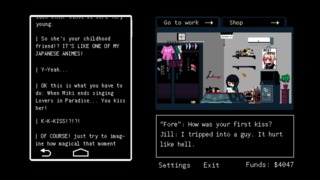
But while VA-11 HALL-A has mixed treatment of its subject matter, it should be noted that there's rarely a problem in the fluency of the English with which it talks on it. Despite being written in Venezuela, everything from the colloquialisms to the grammar would make you think that a native English-speaking studio wrote this script. Their grasp on speech goes beyond the characters right into the virtual websites built into the game; it only makes sense this title has a simulated internet as life in the future, and sometimes even the present, is lived online as much as offline. They nail the lax, irreverent style of their 4chan/Reddit parody right down to every thread ending in a lock. The only form of writing they can't quite wrap their head around is that of a semi-formal news site. See these excerpts:
"A powerful 8.6 magnitude tremor has struck the area of Neo-San Francisco. Fortunately, modern science was able to identify the quake almost an hour in advance".
"Everyone loves Kira Miki and Alice_Rabbit is no exception. You might be wondering what's my proof for this not-so wacky theory".
"Even though most countries in the world have adapted their economies to solve the ongoing problem of climate change, Glitch City still relies on ancient technologies in order to keep costs low with profits high".
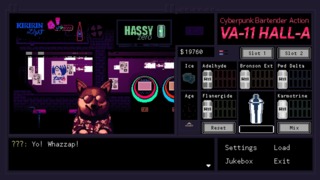
The word choices and grammar suggest that these portions were written by someone who had limited familiarity with anglophone journalism. You could attempt to defend this writing by saying that it's meant to emulate the casual tone of a personal blog, but the use of English would still be too unprofessional. What's more, this publication, The Augmented Eye, is presented as a newspaper and not a blog, and it does attempt objective reporting. There are other odds and ends where the game deals with presentation in an atypical fashion. For example, the GUI for cocktail blending stays on the screen as long as you're in the bar, even though you only need it when mixing the drinks. It's hard to say whether this is artistically valid or not. The traditional view would be that this is lazy design because it clutters the screen with buttons and meters that the player isn't using. However, an alternative way to look at this is that having the practical elements of the UI remain so persistent creates a technological aesthetic which matches this cyberpunk bar. It may also help simulate being a bartender with shelves of bottles always lurking behind your back.
The one atmospheric decision in the bar that's unforgivable is the use of the soundtrack. Every day you arrive at work and manually set the ten songs you want to hear on the jukebox which you do via one of the worst menus I've seen in a game, but we won't get into that. Because you set them in advance, there's no guarantee that the music playing at any one time will line up with the intended emotion of the scene. You can skip tracks, but at best, you're playing a game of OST management because VA-11 HALL-A itself rarely concludes that music should be evocative of the tone of a scene.
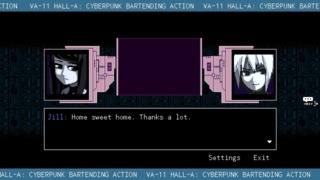
To sum this all up, cyberpunk is the horror of economic, political, and technological systems denying people their humanity. The problem in video games is that the politics, economies, and technology of games are often frequently doing the same, suggesting that there is an oppressive, dehumanising force preying on the subjects of these worlds, but never being quite sure how not to replicate the patterns of those predators. VA-11 HALL-A is a heartfelt attempt to reverse that trend, cherishing its characters, and celebrating the power of societal unity. But we've still got a long way to go. While VA-11 HALL-A's conceit provides a diverse cross-section of its society, its storytelling methods, unpredictable soundtrack, and mixed approach to sexual politics mean that we never see these individuals step out from the crowd to the extent they could in the best cyberpunk films or novels. Thanks for reading.
Log in to comment